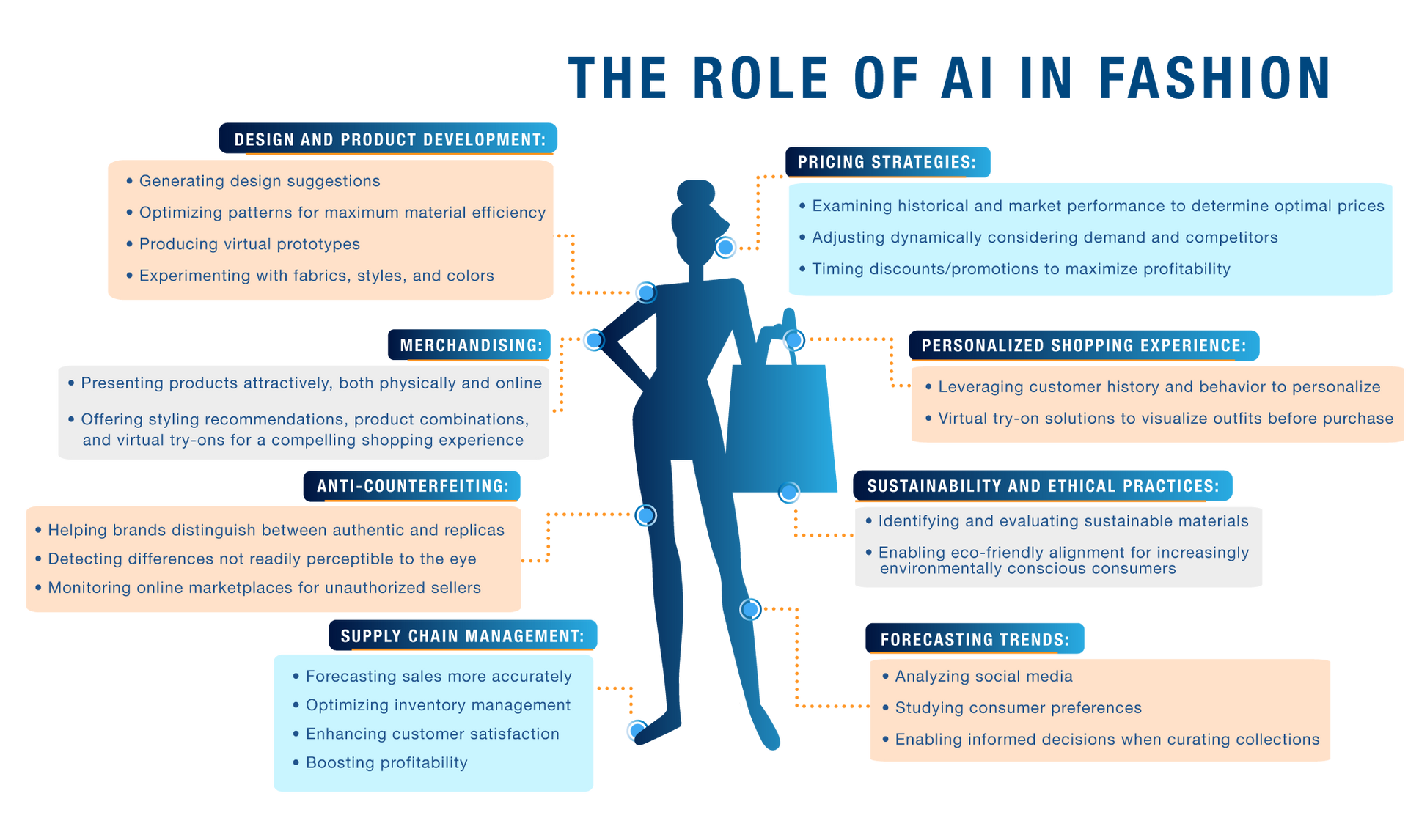Share
In a technology-woven era, the fashion industry finds itself at the intersection of innovation and style, embarking on a revolutionary journey propelled by the advancements in
Artificial Intelligence (AI). The impact of AI spans throughout the industry, reshaping creative design processes and strategically optimizing supply chains. It has skillfully dismantled traditional paradigms, harnessing its ability to analyze extensive datasets from diverse sources. Through this intricate analysis, AI identifies patterns and forecasts trends with precision, exerting a profound influence on the fashion industry. While AI enhances supply chain efficiency, streamlines production, and minimizes waste, AI-powered algorithms additionally can unlock the potential for personalized customer experiences, providing tailored product recommendations and elevating overall satisfaction levels.
Use Cases of AI in Fashion
AI has found diverse applications in the fashion industry, transforming various aspects of design, production, retail, and the overall customer experience. Here are some key use cases:

Personalized Shopping Experience
AI-powered recommendation engines leverage customer preferences, purchase history, and behavior to provide personalized product recommendations, while virtual try-on solutions utilize AI for customers to visualize how clothing items will look before making a purchase.
Forecasting Trends
AI assumes a crucial function in trend prediction and purchasing in the fashion sector, analyzing a wealth of data sources like social media trends, historical sales data, and fashion blogs. By studying consumer preferences and behavior patterns, AI algorithms forecast upcoming fashion trends, enabling fashion businesses to make well-informed decisions when curating collections. This ensures that their offerings are in line with emerging trends.
Design and Product Development
In the realm of design and product development, AI tools seamlessly integrate into the creative process. They not only generate design suggestions but also optimize patterns for maximum material efficiency and produce virtual prototypes, allowing designers to experiment with fabrics, styles, and colors.
Merchandising
In the domain of styling and visual merchandising, AI proves instrumental in presenting products attractively, whether in physical stores or online. By analyzing customer preferences and fashion trends, AI offers styling recommendations and enhances overall visual presentation. This includes suggesting product combinations, outfit ideas, and even facilitating virtual try-ons, ensuring a compelling and personalized shopping experience for customers.
Supply Chain Management
Empowered by AI models trained on historical inventory levels and sales performance, businesses can forecast future sales with greater accuracy, enabling them to optimize inventory management, enhance customer satisfaction, and boost profitability.
Pricing Strategies
AI assists in examining previous sales and competitive pricing, aiding businesses in determining the optimal prices for their products. It supports fashion retailers in adjusting prices dynamically, considering factors like demand, competitor pricing, and the timing of discounts or promotions to enhance sales and profitability.
Sustainability and Ethical Practices
AI becomes pivotal in this effort by aiding in the identification of sustainable materials for fashion products. Using algorithms, AI assesses factors such as the environmental impact, ethical sourcing practices, and cost-effectiveness of materials. Through this evaluation, AI enables fashion brands to make informed choices about the materials incorporated into their products. This alignment with eco-friendly practices not only satisfies the increasing demand for sustainable fashion but also resonates with environmentally conscious consumers.
Anti-counterfeiting
AI plays a critical role in combating counterfeiting in the fashion industry. Advanced algorithms are employed to analyze intricate details and patterns unique to genuine products, helping brands identify and distinguish authentic items from counterfeit replicas. By leveraging AI-powered image recognition and authentication technologies, fashion businesses can detect subtle differences that may escape the human eye. Additionally, AI aids in monitoring online marketplaces and identifying unauthorized sellers, contributing to a comprehensive anti-counterfeiting strategy for fashion brands.
Examples of Companies Using AI
Countless companies within the fashion industry have eagerly adopted AI to refine their products, services, and overall operations. These examples acutely demonstrate the seamless integration of AI across various dimensions in fashion, spanning from personalized styling and virtual shopping assistants to cutting-edge product design and the automation of retail processes:
H&M: Incorporating AI in its recommendation engines, H&M provides personalized product suggestions to online shoppers, enhancing the online shopping experience.
Zara: AI utilized in their supply chain optimizes production schedules and inventory levels, allowing Zara to respond quickly to fashion trends and customer preferences.
Adidas:
AI is used to craft intricate lattice structures in their shoe designs. This not only enhances overall performance but also introduces innovative elements, elevating the brand's product offerings to new heights of sophistication and functionality.
ASOS:
AI-driven visual search technology is used to optimize the user experience in product discovery. This feature allows customers to effortlessly find products by uploading images or screenshots, significantly enhancing the efficiency of the search and selection process.
Industry Trends: Shaping the Future of Fashion with AI
As the fashion industry progresses alongside technological advancements, numerous emerging trends highlight the profound impact of AI in reshaping its landscape:
AI in Augmented Reality (AR) for Virtual Try-Ons
AI algorithms can analyze body shapes, sizes, and movement patterns, enabling users to visualize how clothing items will fit and look in real-time. While enhancing the online shopping experience, virtual try-ons also reduce the likelihood of returns by improving the accuracy of size and style predictions.
Personalized Fashion Advisors
Trends indicate the emergence of AI-driven personalized fashion advisors that provide users with extensive and interactive style guidance. These advisors go beyond analyzing past purchases and preferences; they also incorporate real-time elements like ongoing fashion trends and social influences, delivering tailored and up-to-the-minute fashion advice to users.
Sustainability Analytics
With an increasing emphasis on sustainability, AI is anticipated to play a pivotal role in sustainability analytics within the fashion industry. AI algorithms will scrutinize the environmental impact of materials, production processes, and supply chain practices, assisting brands in making eco-conscious decisions.
AI-Enhanced Customer Service
AI-powered chatbots and virtual assistants are expected to become more sophisticated, offering customers an elevated level of assistance and engagement. Future trends suggest the integration of natural language processing and advanced AI algorithms, enabling these virtual entities to comprehend nuanced customer inquiries, provide personalized recommendations, and even assist in the resolution of complex fashion-related queries.
Stax
has substantial experience with AI capabilities and has worked on several deals in the space, including fashion. To learn more about Stax, our expertise, and the services we offer (including around
Software & Technology) visit our website at
www.stax.com or
click here to contact us directly.
Sources
- Ginsberg, Brandon, “Artificial Intelligence In Fashion,” Forbes, Feb. 2023.
- Balani, Aditya, “Artificial Intelligence can assist fashion industry in cutting down fashion waste,” The Times of India, Jul. 2023.
- 3DLook, “Artificial Intelligence in Fashion: Reshaping the Entire Industry,” 3DLook.
- Javaid, Shehmir, “Top 4 Use Cases of AI in Fashion in 2023,” AIMultiple, Oct. 2023.
- Harreis, Holger, “Generative AI: Unlocking the future of fashion,” McKinsey & Company, Mar. 2023.
- Fashion Retail Academy, “How Artificial Intelligence is Used in the Fashion Industry," Fashion Retail Academy, Mar. 2023.
- Abdulla, Hannah, “Signal: Leading fashion brands leverage AI for supply chain efficiencies,” Just Style, Aug. 2023.
- Nikolopoulos, Stephanie and Melissa Epifano, “H&M, Zara, Fast Fashion Turn to Artificial Intelligence to Transform the Supply Chain,” Thomas Insights, Oct. 2023.
- Tolcheva, Simona, “AI in Fashion: The Good, the Bad, and the Controversy,” Make Use Of, Jun. 2023.
- Intelistyle, “Fashion AI In 2023: What is Trending This Year,” Intelistyle, Jan. 2023.






